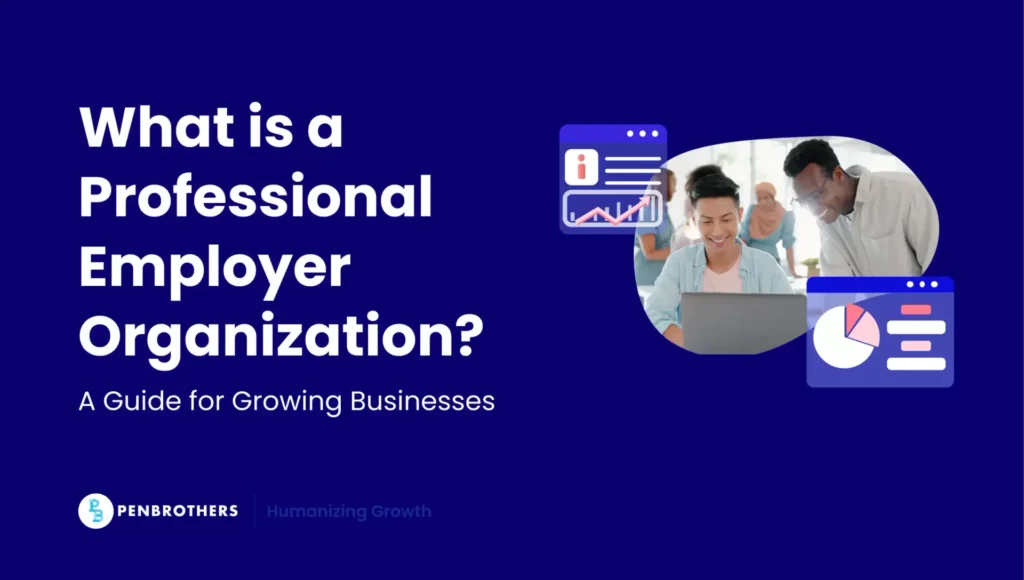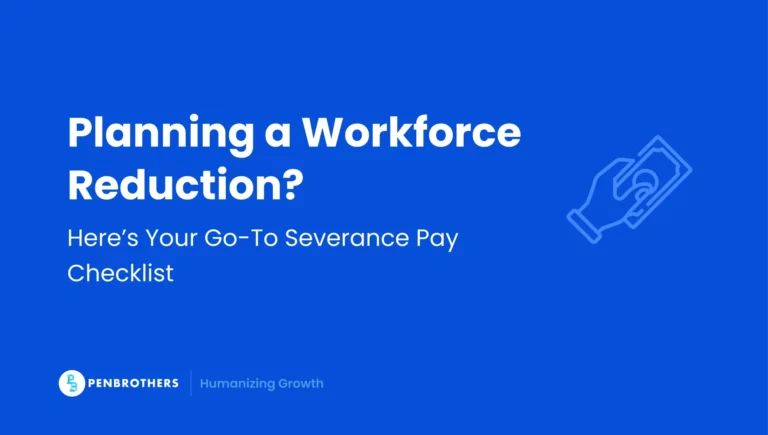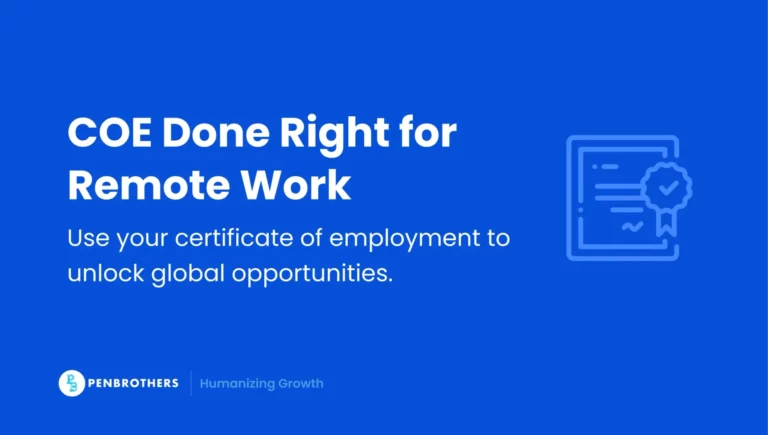Despite the volatile economic landscape worldwide, many companies aspire to expand globally. While global expansion is an optimistic goal, it’s difficult to execute.
Managing payroll across borders poses challenges for global firms. Timeliness and accuracy become increasingly complex when expanding internationally. Comprehending diverse tax and labor laws is another time-consuming undertaking. However, overcoming them is vital for the success of global expansion.
Companies expanding globally circumvent these challenges by offsetting tasks to a global PEO. Global PEOs manage their international workforce on their clients’ behalf. They do so through important HR functions, like payroll and workforce management.
If you’re expanding operations internationally, knowing how a global PEO works will help you decide if you need their services, too.
Let’s cover what a global PEO is, what they do, and their pros and cons.
Key Takeaways
- A Tool for Compliant Global Expansion Without a Legal Entity: A Global PEO (Professional Employer Organization), which is also known as an Employer of Record (EOR), is a service that acts as the sole legal employer for a company’s international workforce. This allows a business to hire talent in other countries without needing to establish its own foreign legal entity.
- It is Fundamentally Different from a Domestic PEO: It is crucial to understand the distinction between a Global PEO and a standard, domestic PEO. A Global PEO is the sole legal employer of the staff, assuming full legal risk. A domestic PEO, on the other hand, operates on a co-employment model, where it shares the employer status and legal responsibilities with the client company.
- Best Suited for Large-Scale, Multi-Country Expansion: Global PEOs are most effective and valuable for large enterprises that are planning to expand their workforce into multiple international markets at the same time. They provide a streamlined way to manage HR, payroll, and compliance across many different jurisdictions.
- May Not Be the Best Fit for Startups and SMEs: For startups and small to medium-sized businesses (SMEs), a Global PEO can be an expensive and overly complex solution. The article suggests that a standard offshoring partnership is often a more cost-efficient and practical strategy for companies that are expanding into just one new international market at a time.
What is a Global Professional Employer Organization (PEO)?
A global PEO is short for a global professional employer organization. Other names for a global PEO are:
- international PEOs,
- employer on record (EOR),
- and global employer organization (GEO).
A global PEO can help improve your global employment strategies. It enables companies to hire international employees while being legally compliant. With their assistance, you won’t need to establish a foreign legal entity to start hiring.
Global PEOs don’t only help with recruitment. They also oversee ongoing HR functions you need to manage your international team.
Some of the global professional employer organization services include:
- Client and employee data protection
- Employee benefits packages
- Employee contracts, onboarding, and offboarding
- Employee engagement and management
- Global mobility services
- International payroll management
- Regulatory compliance
- Tax compliance
- Talent solutions
Sometimes, businesses interchange global PEOs with other employment mobility services. However, they are not all the same. So let’s discuss the differences between a global PEO and other employer organizations.
What is the difference between Global PEO vs. PEO?
While the two might sound similar, a global PEO differs from a professional employer organization or PEO (also known as a domestic PEO).
A PEO goes into a co-employer relationship with their clients. Co-employment means they share employer status, legal responsibilities, HR functions, and risks with their clients. PEOs can hire employees from countries where they have a legal entity.
On the other hand, a global PEO is the legal employer of the international team of their clients. A global PEO does all employer responsibilities for their staff. They also take legal risks away from their clients.
What is the difference between Global PEO vs. Global EOR?
Global EOR stands for global employer of record.
A global EOR and a standard EOR do the same thing. A global EOR is the legal employer of the employees in the countries where they have a legal entity. In this case, they’re the same as a global PEO.
In short: Global PEO = Global EOR/EOR.
But a standard PEO ≠ Global EOR/EOR.
Is there a difference between an offshore company and a Global PEO?
Offshoring companies offer similar services to global PEOs.
They build an offshore staff for you. They also manage HR functions and payroll services on your behalf. Reputable offshore companies provide data security and protect you from legal complications and risks, too.
Their differences lie in the employer’s status.
Offshore companies are more similar to a standard PEO. Hiring an offshore company means you are both co-employers.
One difference it can have with offshore companies would be legal services. Some offshore companies can also offer robust legal protection for their clients.
Know more about how offshore companies work here.
What is the difference between a Global PEO vs. a Temp Agency?
A global PEO offers long-term relationships with its clients.
A temp agency is only responsible for recruiting and hiring temporary staff. Once recruitment is over, you’ll no longer need the temp agency’s services.
Table 1: Differences Between Global PEO, PEO, Global EOR, Offshore Companies, and Temp Services
| Differences Between Employer Services | |||||
| Qualities | Employer Services | ||||
| Global PEO | PEO | Global EOR | Offshore Companies | Temp Services | |
| Services | Global Recruitment, HR Functions, Employee Management | Recruitment in countries where they have local entities, HR Functions, Employee Management | Global Recruitment, HR Functions, Employee Management | Global Recruitment, HR Functions, Employee Management | Local Recruitment Only |
| Employer Status | Sole Legal Employer | Co-Employer | Sole Legal Employer | Co-Employer | Recruiter of Temporary Staff |
| Legal Compliance and Management Services | Full | Limited | Full | Full | None |
A global PEO provides HR services like many other employer services. However, its difference lies in its service depth, legal compliance, and legal employer status.
7 Advantages of Having a Global PEO
Working with a global PEO can be beneficial to your business’ growth. Here are eight benefits of an international professional employer organization to help you decide if their advantages can fill gaps in your growth strategies.
Faster Global Expansion
Tapping into a global PEO’s international network can speed up the establishment of a workforce in several countries.
An example of how they can speed up your expansion is through their pre-established human resources systems. You can skip the steps of establishing a legal entity, recruiting, and payroll processes. Your global PEO can handle that for you.
Legal Compliance for Multinational Regulations
Keeping track of overseas regulations is complicated. Managing multinational regulations and ensuring compliance for all countries is a step up in complexity.
With a global PEO, you have a partner company that manages and follows the regulations of the countries where you operate. You reduce the risk of misinterpreting the local regulations. This avoids the risk of poor compliance and compromising your continued operations.
Connect With A Global Talent Pool
Korn Ferry predicts that by 2030, 85 million jobs will remain unfilled. Given the continued talent shortage, adopting flexible recruitment strategies—like working with a global PEO in HR—is essential.
Global PEOs already have a pre-established network of global talent. You can reduce the time to hire for any unfilled roles. With a faster time to hire, you reduce recruitment costs, too.
Streamlined Cross-Border Payments
One of the most complicated HR functions with global expansion is cross-border payments.
Each country has its employee compensation regulations that you have to follow.
You also want to ensure timely payments for your employees. That way, employees stay engaged, leading to better work performance.
You can avoid payment delays with a global PEO for payroll.
They have the expertise and payroll systems that expedite timely employee payments. They also ensure pay compliance with tax regulations based on the employee’s jurisdiction.
Improved Global Workforce Management
Both your offshore and internal teams benefit from your partnership with a global PEO.
Focusing on core competencies is key to maximizing employee productivity and efficiency. By partnering with a global PEO, your internal HR team won’t have to execute both domestic and international HR functions. Instead, they can coordinate with the global PEO, reducing HR process complexity for both teams.
Strengthened Data Security
A trusted global PEO knows how to manage your business data and your employees’ data.
Most of their work involves building and working with remote teams. Since they’re a thoroughfare of data between you and your remote employees, ensuring they are GDPR compliant is crucial to your data security.
Related: Protect your remote teams with these cybersecurity protocols.
Availability of Legal Protection
One of the advantages of working with a global professional employer organization is legal protection. Many employer organizations don’t have robust legal risk protection for clients.
As the legal employer of your international team, a global PEO will shoulder legal responsibility for your employees.
Trusted global PEOs also keep you legally compliant overall. They have an in-house team responsible for legal compliance. They also track changes in labor and tax laws to ensure your continued conformity to them.
Table 2: 7 Advantages of Working With a Global PEO
| 7 Advantages of Working With a Global PEO |
| Faster and less risky expansion |
| Legal compliance for multinational regulations |
| Connect with a global talent pool |
| Streamlined cross-border payments |
| Improved global workforce management |
| Strengthened data security |
| Availability of legal protection |
The benefits of global PEOs range from faster expansion to better global workforce management. Thus, if you work with the right global PEO, you can gain these benefits for your company, too.
4 Disadvantages of Having a Global PEO
While global PEO has its benefits, it also has its drawbacks. Let’s discuss these cons, so you can accurately weigh if global PEOs fit your business needs.
Ineffective Use of the Global PEO
A global PEO doesn’t mean that everything is smooth sailing for your expansion efforts.
Some companies work with a global PEO without a formal expansion plan into emerging markets.
The better approach is to create a global expansion strategy with global PEOs being one phase in it. That way, you can plan the best timing to hire a global PEO. It’ll also help you decide to what extent you want its involvement in your expansion.
Slower Conflict Resolution
Global PEOs work with multiple clients and manage multinational workforces simultaneously. Thus, if you encounter an issue with their approach to employee management and engagement, it can take a while before you get a response.
Given the scale of clients they work with, it’s harder to get a personalized approach from them. That’s unless you pay additional fees.
Less Flexibility in Employee Engagement
You won’t have as much control over the choice of benefit providers for your employees. That’s because global PEOs have a set of benefits providers they have pre-established connections with. Thus, you’ll have less flexibility on employee engagement tactics for your overseas teams.
More Expensive For Startups
Global professional employer organizations work better for larger enterprises. That’s because a global PEO’s expertise is working with staff from multiple countries simultaneously.
When you’re a startup, you don’t need to scale that drastically yet. With most startup failures being caused by financial issues, wise resource management is essential. Thus, spending resources on a global PEO is not the most cost-efficient approach.
Standard PEOs and offshore companies are the better choice in this case.
They provide the same services for you. They achieve that at a lower scale and cost, too. Thus, they’re a more resourceful approach to global expansion.
Related: Are you a startup? Discover if offshoring is good for your small business here.
Table 3: 4 Disadvantages of Working With a Global PEO
| 4 Disadvantages of Working With a Global PEO |
| Ineffective use of the global PEO |
| Slower onboarding |
| Less flexibility in employee engagement |
| More Expensive for startups |
When Should You Use a Global PEO?
Based on the pros and cons, you can determine when a global professional employer organization is more suitable for you.
For startups and medium-sized companies, a global PEO should be carefully considered. If your fiscal capacity for global expansion is sound, then global PEOs can be a less risky investment. However, they’re not your only avenue to international growth.
Standard PEOs or offshoring to countries like the Philippines are more cost-efficient. These savings matter more to the bottom line of businesses with lean teams and limited resources. However, businesses of all sizes can benefit from improved cost efficiency.
See how offshoring works for Servantex, a workforce management service in the US.
Its goal was to build its first customer service center in the Philippines. They started only with five employees. Eventually, offshoring led to a 6x growth in their team. Plus, it gained 79% of cost savings per role hired.
According to Jane Hamilton, Chief Administrative Officer of Servantex, they gained more than just cost savings: “We were able to scale our internal services without putting a risk that we might have to lay people off again if it ended up being temporary.”
Unlike startups and mid-sized companies, large enterprises can benefit from both global PEOs and offshore companies. They can use the entire roster of HR functions that global PEOs provide. They also can expand to multiple new markets simultaneously.
Global PEOs are best for an enterprise expanding to multiple global markets simultaneously. Offshoring is more efficient if they’re targeting one international market at a time.
How Much Does It Cost to Hire a Global PEO?
There is no standardized cost to a global PEO. It depends on which global PEO you work with.
Some charge a package deal with specific employee numbers and a limited set of services. Others charge per employee.
The factors that influence the cost of a global PEO include the following:
- Functionalities you need
- Types of employment contract (e.x, Contractual vs. Employee)
- Job roles
- Package pricing vs. bespoke solutions
- Length of engagement
- Staff compensation
- Management fees
- Other additional amenities
The simplest pricing strategy of global PEOs is a fixed monthly fee per employee, similar to that of EORs and offshoring companies. However, like offshore companies, the pricing changes based on the services you avail.
Recruiting a global team is one service. You can add other services like business enablement and payroll management. The monthly cost per head will then scale up or down based on the services you use.
Related: Compare the salaries of remote employees. Calculate the hiring costs of offshore talents transparently.
Building A Multinational Workforce With Expert Guidance: From Global PEOs to Offshoring
Global PEOs simplify global expansion for large companies. However, global professional employment organization companies are not the simplest or the most cost-efficient global expansion strategy for startups and mid-level businesses.
If you run a small to medium-sized business, offshoring companies make global expansion more attainable. They provide similar legal services to global PEOs. They also hire qualified offshore employees on your behalf, enabling you to scale your international operations. Offshore companies will source, onboard, and provide continuous HR support to your global team.
Once your company can scale operations internationally, working with a reputable offshore company will propel your global growth. Through offshoring, you too can reap benefits like 71% cost savings in salary costs while expanding globally. That way, you can cushion other global expansion aspects, like strategy and product development.
Frequently Asked Questions
A Global Professional Employer Organization (PEO) is an external company that serves as the full legal employer for your international employees in countries where you do not have a business entity. It manages all HR functions, including payroll, benefits, contracts, and legal compliance on your behalf.
The primary difference is the employment model. A Global PEO acts as the sole legal employer for your international staff, taking on all legal risks. A standard PEO enters into a co-employment relationship, where it shares the legal employer status and responsibilities with your company, which typically must have a legal entity in that location.
Yes. The terms Global PEO and Employer of Record (EOR) are generally used interchangeably. Both refer to a service where a third-party organization becomes the full, legal employer for your staff in another country, handling all related administrative and compliance tasks.
The main advantages are the ability to achieve faster global expansion without the cost and time of setting up foreign legal entities; ensuring legal compliance with complex multinational labor and tax laws; gaining easier access to a global talent pool; and streamlining complex cross-border payroll and payments.
Not always. A Global PEO can be more expensive and is typically better suited for large enterprises that are expanding into multiple countries simultaneously. For startups and small businesses that are focused on expanding into one new international market, a standard offshoring partnership is often a more practical and cost-efficient solution.






